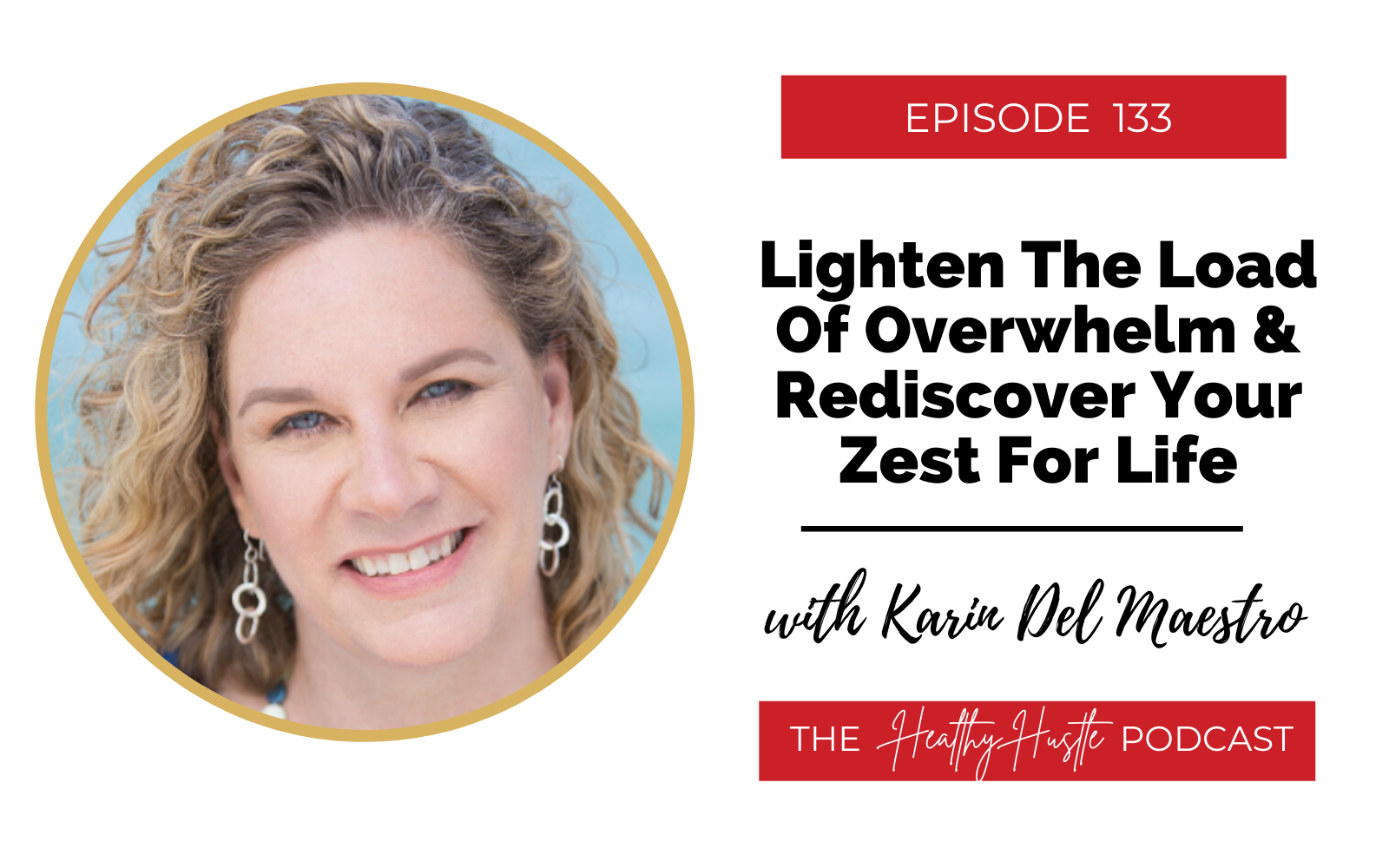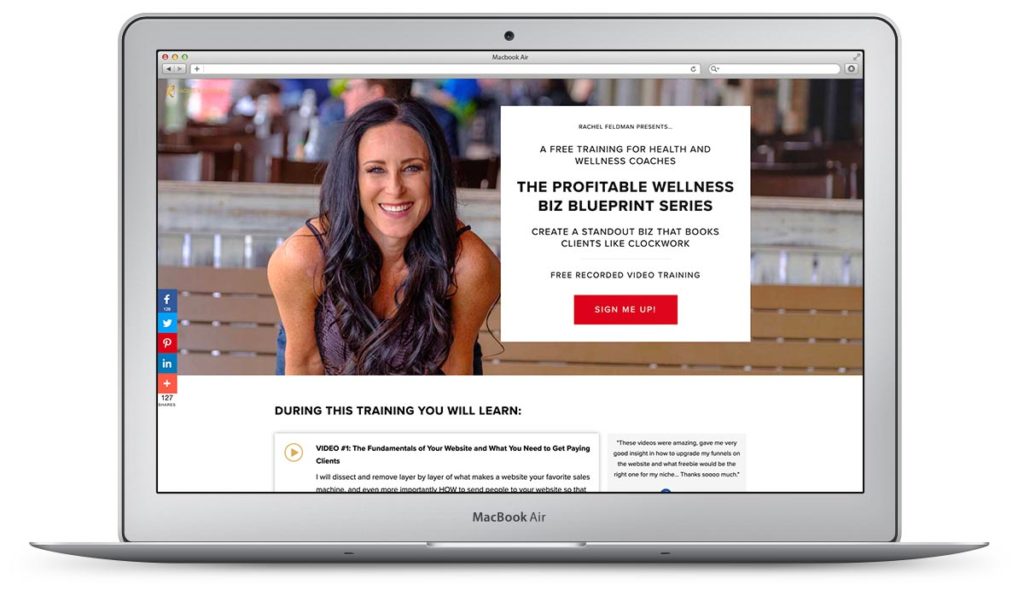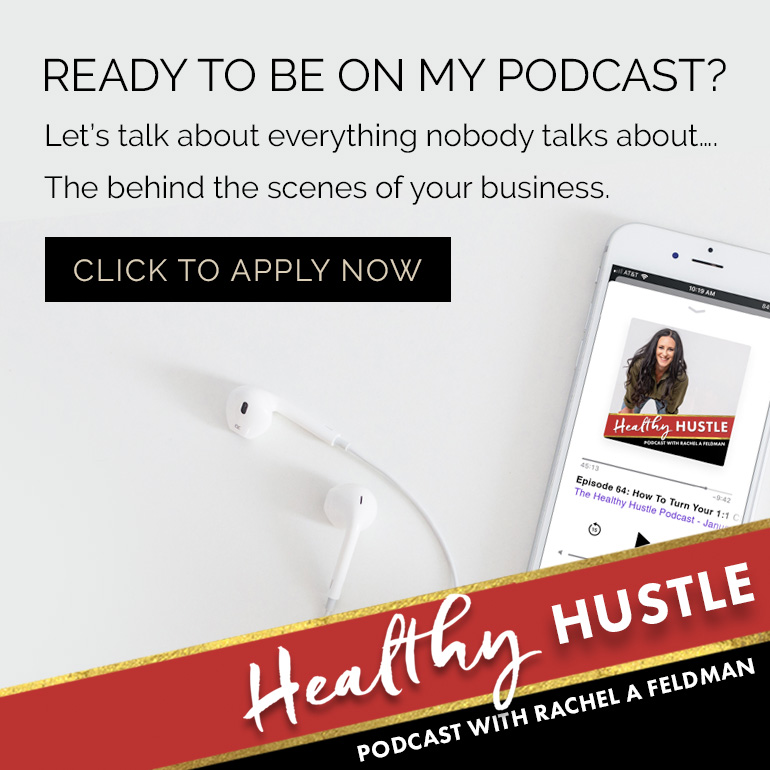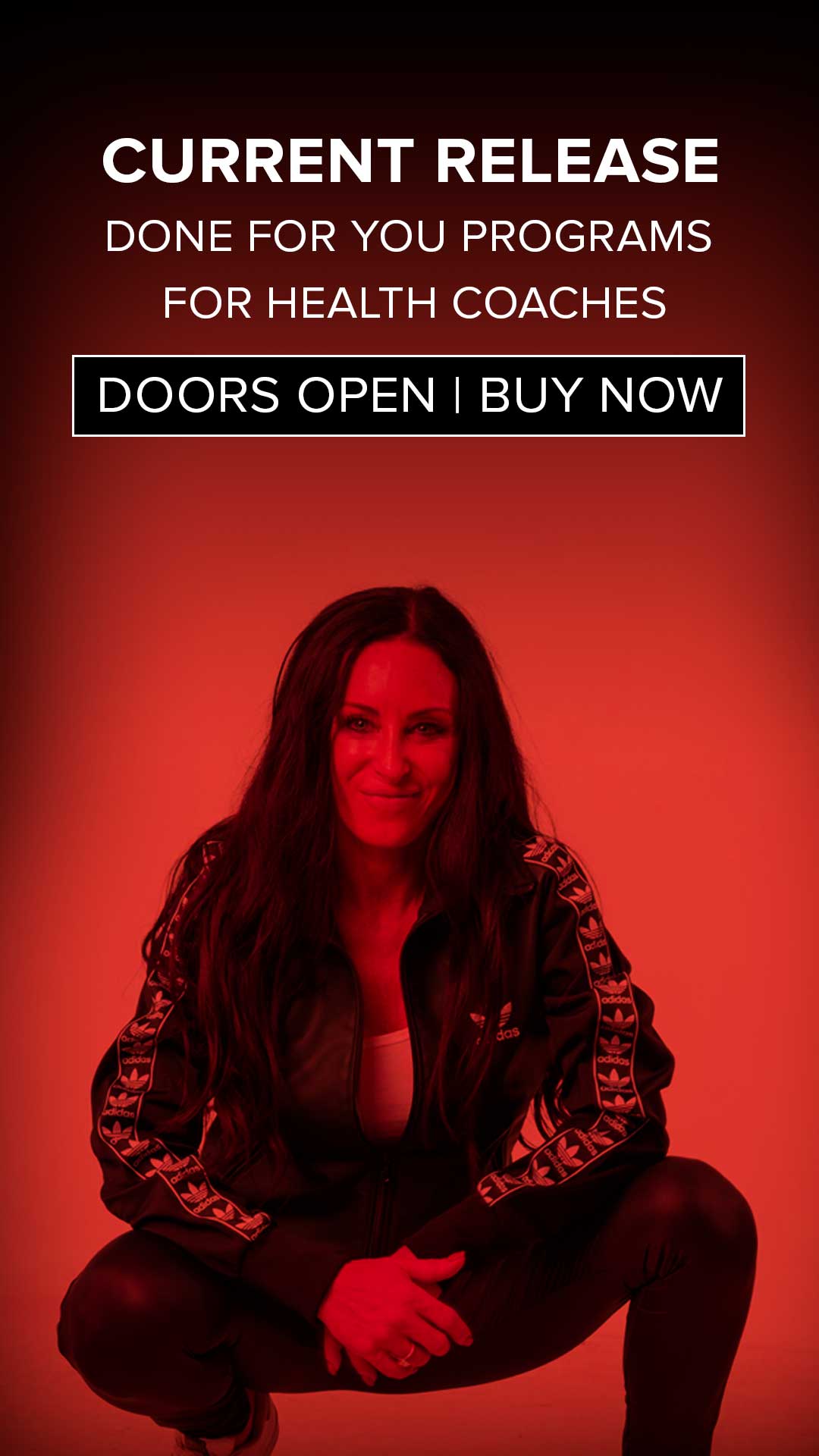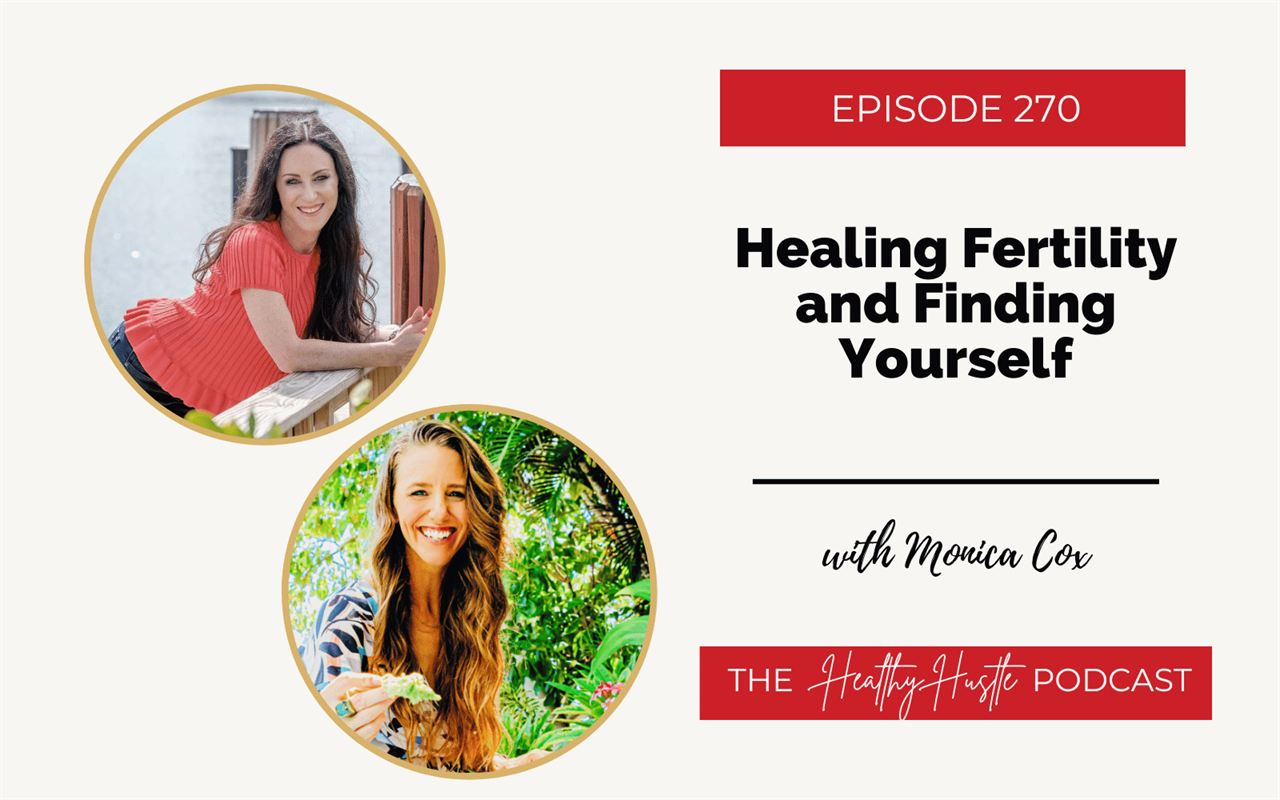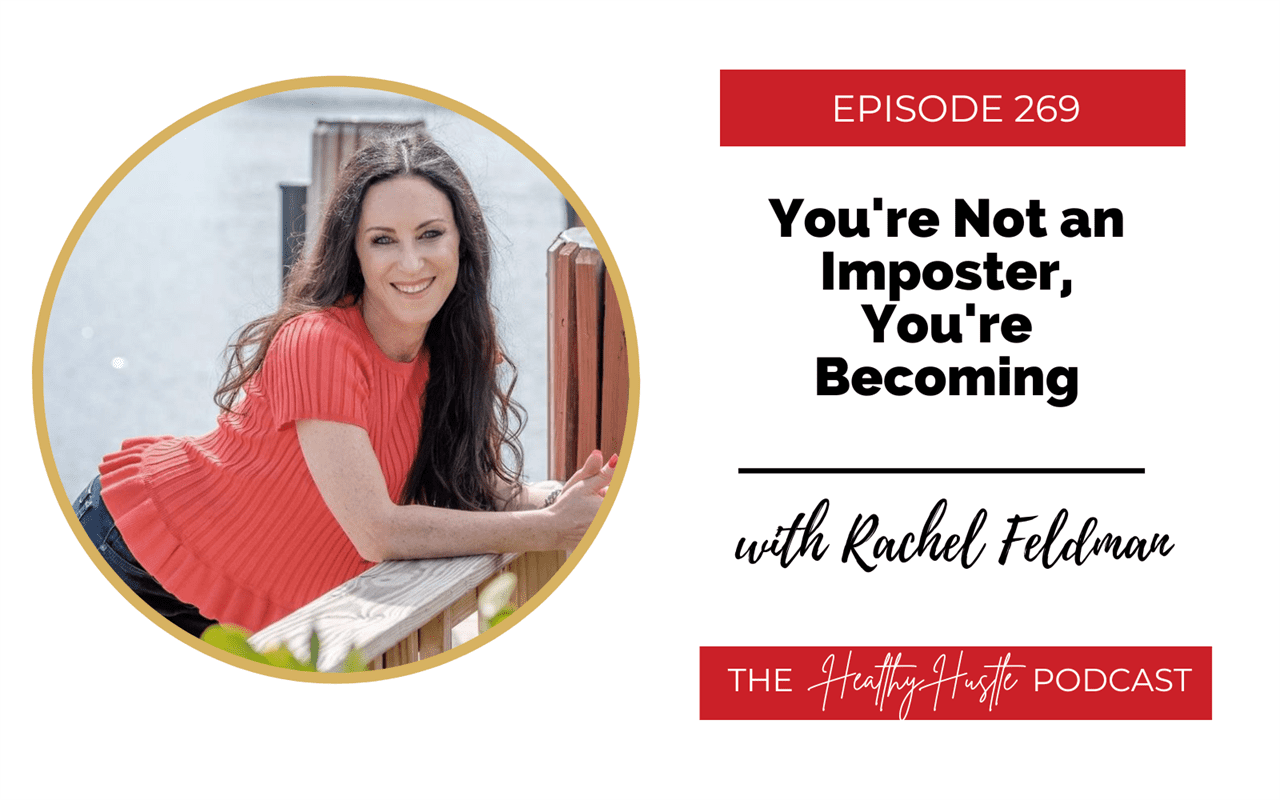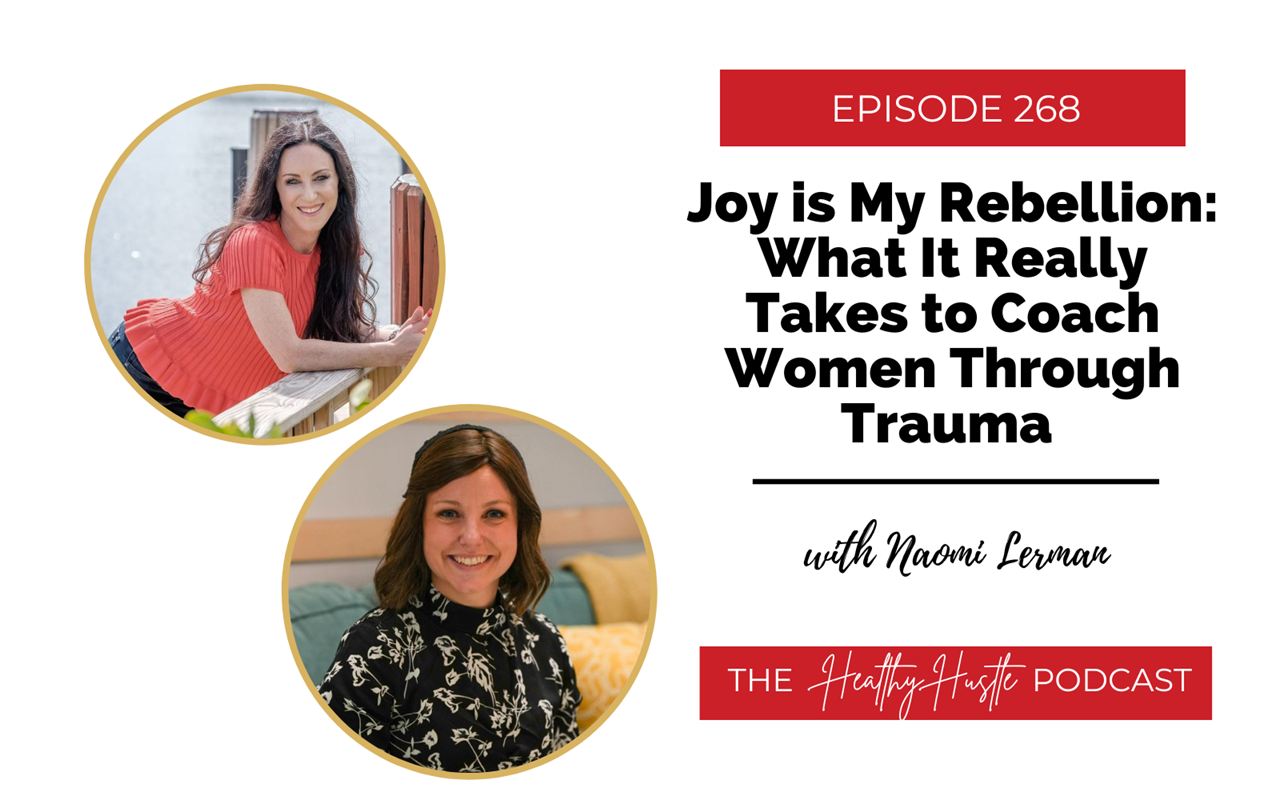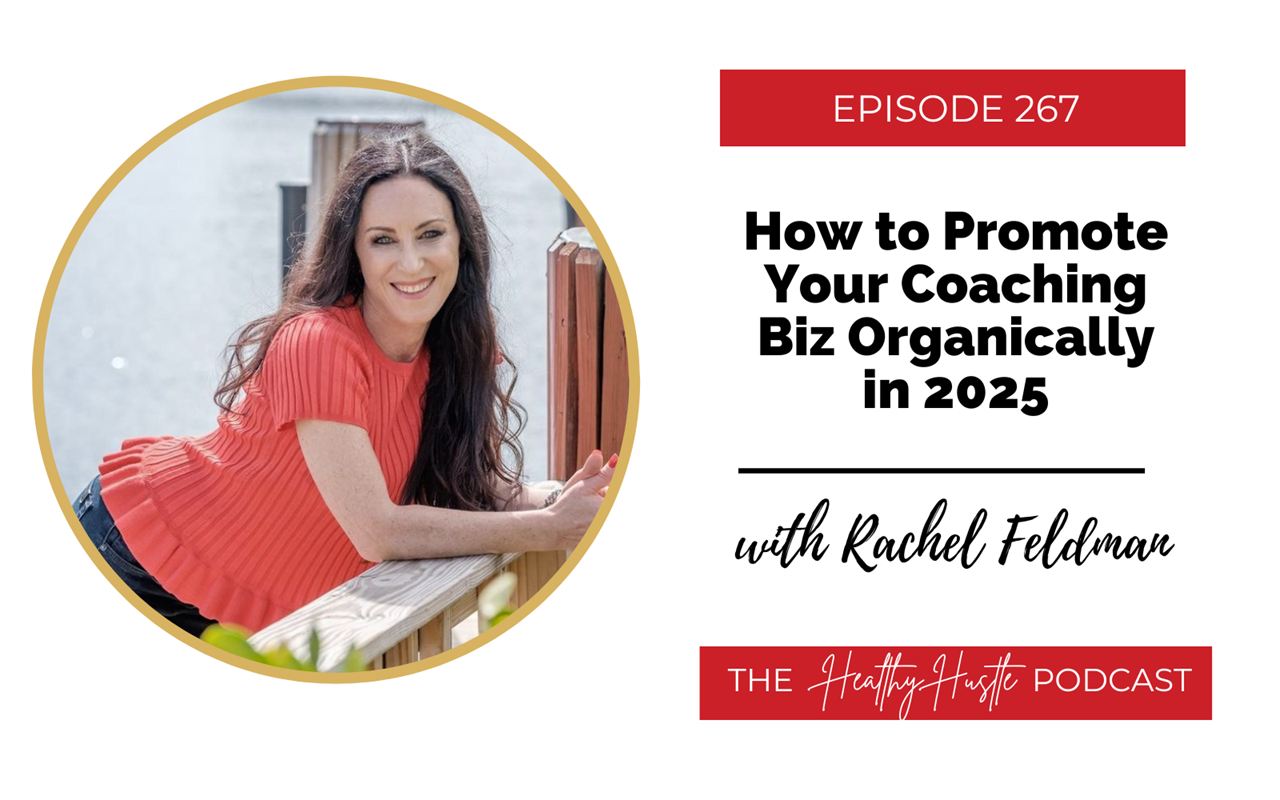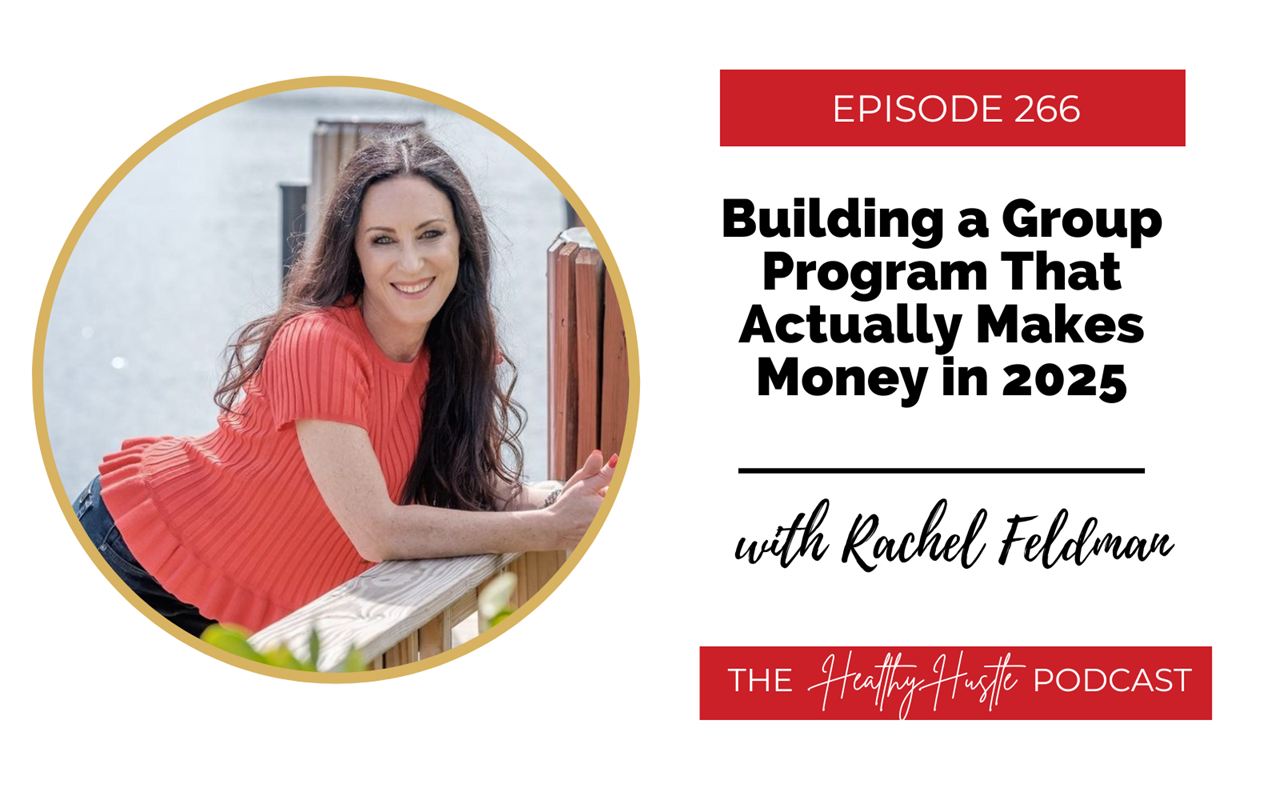We’ve all got stressors coming in our lives, whether it’s a full-time job, family matters, autoimmune issues, a diagnosis, or something else. When left unmanaged, these stressors can create massive overwhelm for us. Luckily, there are simple ways to lighten the load you’re carrying and our guest today helps her clients do just that!
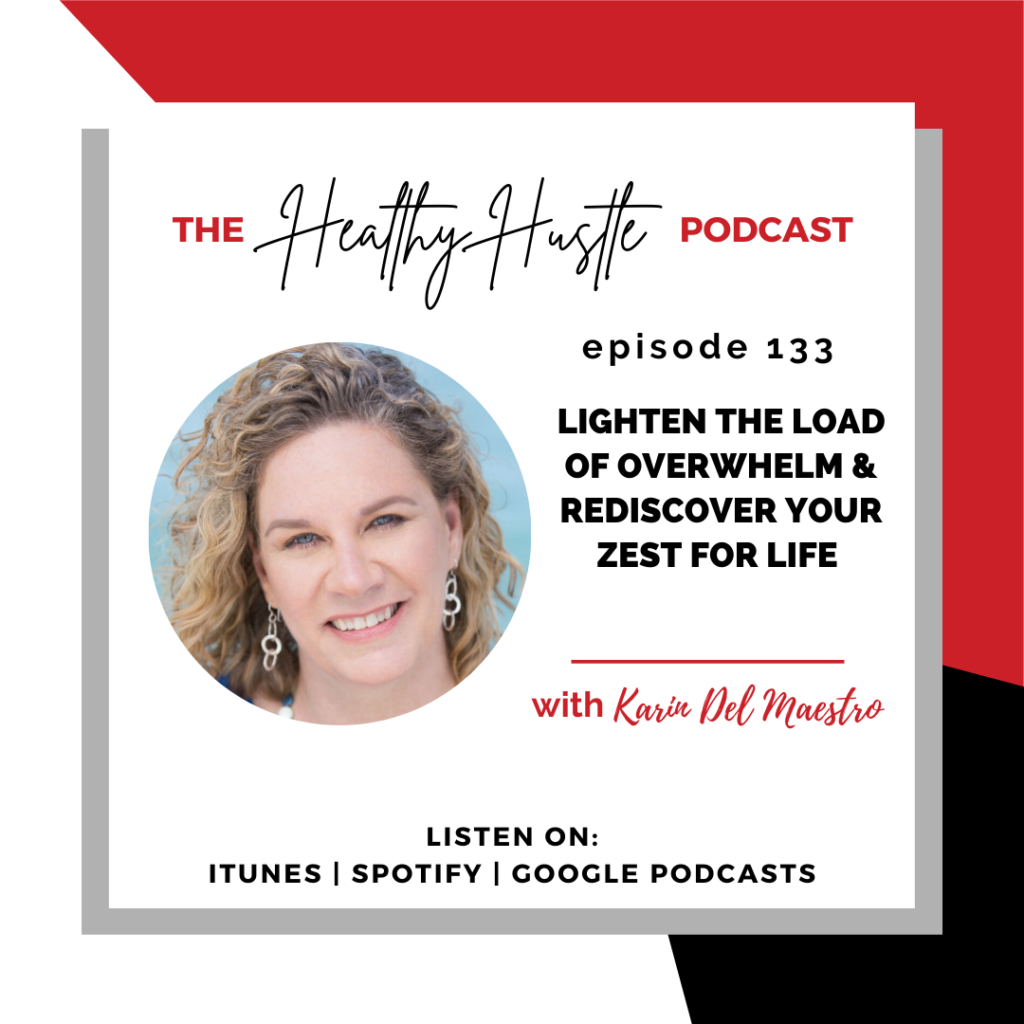
In today’s episode, I’m talking to Karin Del Maestro, a Health and Transformation Coach who specializes in helping breast cancer survivors get back their energy and their life after treatment ends. Karin is sharing her own health journey and how that’s impacted her ever-evolving niche and coaching business.
During our conversation, we talk about how Karin instills self-care into her client packages, what you need to do to get off the hamster wheel of overwhelm, and how to take a pause in your business, when and where you need it. Plus, Karin is giving all the details on how to implement self-care, self-love, boundaries, and self-worth into your daily life so you can learn to step back from the overwhelm, re-energize yourself, and reclaim that zest for life.
Connect with Karin:
Website: https://karin-del-maestro.mykajabi.com/
Facebook: https://www.facebook.com/healthylivingafterbreastcancer/
Instagram: https://www.instagram.com/karindel34/
Rachel: Hey guys, I’m so excited for this episode. I have my good friend Karin, who I’ve known, how long have I known you?
Karin: I was actually thinking about that. I think it’s almost nine or 10 years now.
Rachel: Well, knowing this amazing woman through all of her journey, which we’re going to talk about today. What stands out in her work is the amount of self-care, self-love, boundaries and self-worth and all of that stuff that we often put to the side when we have a major trauma in our life, or we’ve experienced an illness or sickness. Or maybe you’re like Karin and experienced cancer. So with that, why don’t I just open it up. Karin, can you just introduce yourself?
Karin: Sure, thank you. First of all, I’m really, really honored and happy to be here with you. I can’t believe how long we’ve known each other. It’s been a journey. You’ve seen me from the beginning of my coaching practice to where I am now.
For those of you who don’t know me yet, I’m a health and transformation coach, breast cancer Abraca to thriver. I specialize in helping breast cancer survivors to get back their energy, get back their life, especially after active treatment has ended. That was a more recent shift in my practice, and my coaching practice after my own breast cancer diagnosis.
When I realized, as I was going through treatment and I got to the end of my treatment and I remember sitting in my plastic surgeon’s office and her saying to me, great, I’ll see you in three months, you’re good. It’s that moment where we know that we should be celebrating because it’s the end – whether it’s the end of chemo, or radiation, or whatever part of your journey that might be.
Instead, I had this gut-wrenching sob come up, this immediate fear of, oh my gosh, what now? I felt like the rug had been pulled out from under me. The weeks that followed were a really challenging time and it was then that I actually realized, well, you’re kind of uniquely qualified to help women at this time, first of all, having been through it, but then with also all my other, bouncing back after major traumas.
So it’s become my passion, my mission and something obviously, it’s really important to me to help support the breast cancer community.
What Her Coaching Niche Started As & What Is Now
Rachel: Tell me about your own journey. Take us back through where you were coaching already when you got your breast cancer diagnosis. What were you originally like? What was your niche in the beginning?
Karin: Well, it’s a good question. I think niche is something that many of us struggle with, as health coaches. I know you talk about it a lot on your podcast here. Because we are able to work with so many people, sometimes it’s difficult to narrow that down.
I remember it was a couple of years for me really before I started to narrow it down and then I realized, Okay, well, women who were in their 40s, in their perimenopause, heading into menopause period, that was kind of what I was working with. A lot of women came to me for weight loss, even though it wasn’t a specialty, but that’s what they were looking for.
My niche kind of changed as I’ve been through many major traumas. So every time there was a major trauma, for instance, I lost my mom, my dad, and my younger brother in the past five years. My husband and I have moved seven times in eight years including to and from the Caribbean.
I remember talking to you when I was down there and had the beautiful ocean and palm trees and everything else. Now I am in Florida, still with palm trees and sunshine. I love it and my body loves it. I’ve recognized that my body just does so much better in a warmer climate.
So I went through all of these major ups and downs in life. So my niche would shift a little bit going through each one because I think that as we go through personal things in our life, our experience changes, our education about certain things changes.
But there’s certainly been a lot of consistency for me because I’ve always been about removing inflammation consistently throughout my journey. No matter who I’m working with, I’ve always talked about eating clean, managing your stress, and reducing toxins in the environment, first and foremost.
Something that I really lean into even more now because I realized that it is the thing that really has gotten me through everything is self-care.
Rachel: So let’s even dive in. Tell me how far along in your coaching did you get your diagnosis?
Karin: My diagnosis was 2018. I was five years into my coaching practice at that point.
How She Packages Her Program To Instill Self-Care
Rachel: So you solely work with women right now instilling those habits and self-care and that self-love. Tell me what that looks like for your clients in their life? How have you packaged your program to make sure that you instill this?
Karin: Most of the women, when they come to me, don’t realize –like a lot of our clients– the underlying things that are going on, and so most of them are recognizing that they’re just completely drained and exhausted, and they’re running on fumes.
So that’s always the first thing we look at. How can we help to get some energy back? That way they can start to plan out, I like to think of it being their best life yet, because I believe that trauma is an open door to massive transformation in their lives. So that’s where I start.
For me that’s the starting point, before we even start talking about self-care because I want to get them a quick win. I want to get them some results quickly. So for me, that biggest step is talking about what they’re eating, because we’re doing it minimum of three times a day. So for me, that’s always the first thing that I’m going to look at is how can we tweak what you’re eating, to get you that quick win? Whether it’s adding in a smoothie, whether it’s adding in lemon water first thing in the morning. Talking about what they can take out without feeling like they’re being deprived. Let’s see where the energy sets are and let’s see where we can start to block them.
Rachel: I can’t identify with having cancer. But I know that being a person who has autoimmune stuff in this current world, where I think a lot of people struggle with their health, I wouldn’t say it’s any comparison. But I know that there were times when I wasn’t feeling well, and that’s when I really needed to amp up my self-care.
Why We Don’t Have The Energy For Self-Love & How We Can Handle That
Those were the times that I had that debate in my head of, no, I don’t feel like doing it, I don’t want to do it. Even today, I was running and I was like, I don’t want to be running right now. I thought, you don’t always want to do the things that are really great for you and to just slow down and be in the present. When I realized that today with the habits that I’ve been working on, I realized, so often, that’s where we get with our habits. And that’s a big part of self-love, we feel like we just don’t have the energy for that. So how do you handle that with your clients?
Karin: That’s such a great question. It’s a question across the board. We can say universally, in this world, most people know that they need to eat better and move their body and drink more water. Yes. But they struggle to do it.
This is the part that I love, because that’s what I want to figure out for somebody, why aren’t you doing it? You need to, why aren’t you? That is such a big topic and something that really isn’t talked about a whole lot. But the first thing I invite people to do, especially if you’re in an autoimmune flare-up, or you’re having a day where you’re just absolutely exhausted. Maybe your stress levels are super high and you’re feeling really under the weather.
How To Greet Your Body With Gratitude & Pay Attention To What You Need
My first thing is to greet my body every day with, Hey, buddy, how are you doing today? What do you need? So that when you first wake up, you can get out of bed. It’s almost like a check in from head to toe. Body, how are you doing today? It may sound kind of cheesy, but I really want to welcome my body to the day, right.
One of the things that really helped get me through my cancer and everything is gratitude. And it’s not just gratitude for all of these outward things, but it’s gratitude for this vessel that carries me through each and every day. Greeting my body with, how you’re doing, recognizing and observing, not judging, but observing.
Am I aching anywhere? Am I feeling good? How’s my gut feeling? Am I bloated? Am I tense up here? How am I as I’m waking up? Am I ready to greet the day and climb high buildings and do things like that? Or am I feeling a little bit slower pace today?
So we start there, because when my whole methodology, and everything I do is to lighten the load that you carry. I want to make it easy for you. I want to make it simple for you. And the last thing that any of us need is anything else being added to our plates.
I think that’s the hardest because when you’re not feeling well, and even when coaches are pushing themselves because they’ve got a full-time job, or they’ve got their own autoimmune or, or family or whatever stressors coming in and creating that massive overwhelm, which is inflammation. It’s really hard to step back when we feel that we don’t have the energy because it’s just that massive overwhelm that has kind of pulled out all that zest for life.
So instead of saying, Oh, I have to go for a run to de pressure, we’re saying, Maybe I need to breathe and stretch today instead. For me, moving our body is obviously crucial to everything and how our body functions. It’s crucial for our mind, body, and soul. But how we move and having the flexibility to adjust that, depending on how we’re feeling is really key. Because if we’re already exhausted and drained, there’s probably adrenal fatigue going on behind us.
Rachel: Over the last year and a half, I dealt with some of the worst burnout that I had ever had. But I did really listen to my body every day. Today? It’s just a stretch day. Today? It’s a sauna day. Today is a do-nothing day. Today, though, when I was running that was a little like, no, get your tickets moving day.
How To Get Off The Hamster Wheel Of Overwhelm
Karin: But there’s a difference. This is where it’s important that we do it from a place of observation, not judgment. So then we’re not beating ourselves up saying, Oh, you’re so lazy, or these old stories and old beliefs are coming in. We’ve got to be really mindful of that because that is a big part of the work that I do. We work on why that inner critic comes into play and that’s a huge portion of why we stay in that overwhelm or we don’t get that setback from life.
Rachel: I absolutely believe it.
Karin: But people don’t know the steps to take. You feel overwhelmed, you feel stuck, you’ve got the inner critic beating yourself up, you’re feeling worse and worse. Then your binge eating, binge drinking, numbing yourself and shopping, whatever it is and it becomes a perpetual cycle, because then you’re gonna be upset for that behavior too. And that’s gonna make you feel more sluggish. You’re gonna have a lot more inflammation. It just keeps going on and on.
So we get stuck there and don’t know that there’s a way out and the way out is really to step off that hamster wheel where you’ve been going through the motions of doing doing doing going every day, and realizing that you get to step off that and you can change the pace.
Especially after going through a cancer diagnosis and treatment, especially after an autoimmune flare up. To push ourselves is not the answer. That is going to perpetuate the recovery. We start slow. This is something that so many people struggle with. We live in this instant gratification community in the world right now. We’re looking for quick results. So we think that we have to go from where we are today to running a marathon tomorrow.
Or in the instance of the women that I work with, they want to get back to whatever it was like before. There’s this perception that as soon as you’re done with change, it’s done. And it’s not the case, by a long stretch. There’s actually an equation for the length of time that it takes, and it’s much longer than people anticipate.
During this time, we get to do what I call, going into our cocoon. It’s nurture time, it’s time to take care of you and put yourself first. Because everybody else around you is saying, but you’re done with treatment. Come on. Let’s get back to it. The challenge becomes, do we put on that smiling mask and pretend, which is so exhausting and draining, and try to keep pushing and try to keep doing because we don’t want to let people down? But we’re not putting ourselves first.
Self-Care Habits To Help You Stay Emotionally, Socially, Spiritually & Physically Healthy
Rachel: So what would you say are the top habits that you have in your day? Clearly, you got diagnosed midway through your coaching career, and you still kept your coaching career. So tell me what your habits are like in your day that really keep you down?
Karin: Well, it depends on the day, obviously. On a day where I’ve got more energy, I have, I call it my daily power list, essentially. It’s making sure that I’m hydrated, number one. If we’re not hydrated, it doesn’t help. Number two, checking in with my body always. How you doing? What do you need? Giving it what it needs, not just saying how you’re doing but actually doing it. Making sure that I’m eating properly and eating anti-inflammatory foods. Foods that are actually fueling me and nourishing me. Those are more of the physical things, which is often what we think of when we think about self-care. Moving my body, going for a walk every day.
What we don’t always think about are the emotional sides of self-care, the social sides of self-care, and the spiritual sides of self-care. Because it is about mind, body soul, it’s the whole thing. That’s where things like managing your stress come in.
So for me, that’s breathwork and meditation every single day. You will find me most days taking an Epsom salt bath at the end of my day. Without fail, that’s my jam. That’s my quiet time. Sometimes depending on the timeframe, I might also be doing meditation while I’m in the bath. I could be doing double duty depending on how busy my day is. I’m just saying.
I also remember one of the things that one of my oncologist said to me going through treatment was that meditating for 15 minutes twice a day has been proven to change our brainwaves. Now prior to that I was doing it once a day. I’ve since changed it to twice a day. It’s really helped me to go from the sympathetic survival mode fight or flight mode to parasympathetic. Rest and digest can actually heal. If we’re not taking ourselves to that mode and recognizing stress and anxiety and things like that, it’s gonna be really difficult to get our energy back.
In general, when we go and go and go and we don’t pause and take rest or pause and have these rituals in our life to ground us, all of a sudden we just are more overwhelmed, we’re getting sick and we’re getting allergies and our periods aren’t on time. All these things just start to go awry our digestive issues, skin issues all seem to come up under the sun.
Even, I’ve got my cup of tea here now. You’re always gonna see me with a cup of tea. I take the polls and drink the tea. I may feel the warmth, sometimes I feel the love, and I choose my tea based on how I’m feeling and what I need. Even things like that.
When it comes to the social self-care, and I might geek out a bit here, because it’s setting boundaries, it’s saying no. How do we take that pause? Well, we typically have to say no to things to take that pause. And that’s difficult, especially if you have grown out to be a people pleaser. Recovering people pleaser over here. Or recovering perfectionist, all of these tendencies.
By the way, those are two personality traits that are common amongst breast cancer survivors, there are actually seven personality traits. So it makes sense knowing that to help lower our risk of breast cancer. We want to look at those and say, How can we do it differently? It’s setting boundaries and sticking out for yourself. That means knowing who you are. If you don’t know who you are, you don’t know who you’re sticking up for.
Rachel: Well, and it’s really hard to set boundaries if you don’t see yourself worth as well.
Why Everything Leads To Our Own Self-Worth
Karin: Absolutely. That’s a big part of getting over perfectionism is really building on that whole foundation of the self-worth. The thing is, self-care, leads to self-love, leads to self-compassion leads to self-acceptance leads to self-confidence. And all of that is your self-worth. Your self-worth is wrapped up in all of that.
So it starts with this saying, I matter enough. By the way, we’re talking about self-care. I want to make sure that everybody knows that we’re not talking about magnesium paddies and massages, because even though yes, those are wonderful, and they are acts of self-care.
My definition of self-care is that self-care is the conscious act that we take to promote our physical, mental, emotional, and spiritual well-being. That’s my definition of self-care. So what that means is you are standing up for yourself, you’re saying what you want, what you need, and you’re taking action on it, and actually doing it.
If we go back to the food for a second, why aren’t people able to stay on track with healthy eating? It’s nothing to do with willpower. It’s to do with the fact that you don’t yet know how to prioritize what you need. Because when we’re able to shift our mindset to know, I really matter and I made myself and my family promise to do everything I could to not get this disease again. That’s a big promise. That promises me saying no, I matter enough and so do my loved ones for me to do what I need to do for myself first, no. I think that relates to almost anyone in this world and that’s such a big thing. If we make this promise to ourselves, any promise to put ourselves first, we are always showing up with boundaries, we’re always showing up in that place of self-love and self-care because it really extends to almost every aspect of our life.
Rache: Wow 100%.
Karin: There’s a lot of reasons why we find it so hard. We want to make everybody happy. We don’t wanna let people down. We think it may be a sign that we’re not good enough. These are all beliefs. A belief is simply a thought that you keep thinking.
So we’re able to change those thoughts, we’re able to do something about it, so that you don’t have to keep carrying that with you. We’re lightening the load some, taking away that old stuff that doesn’t work for you anymore. It’s not serving you. It never did. But it really isn’t now. Take it away. Getting rid of the stuff and bringing in things that really worked for you that are effective.
How To Overcome Your Story & Uncover Your Self-Worth
Rachel: What do you say for the client who comes to you and they are just reliving those old stories over and over and so those new habits are not able to come in because all of that inner critic and self-worth stuff comes up?
Karin: Well, they don’t come in knowing those stories. Most people don’t know the stories that are playing in their head. It takes a little bit of time and some digging to really figure that out. So it depends when somebody comes in. If they’re already an open book and have done some work on being honest with themselves.
I think so many of us and I can count myself in this because I did this for years, think that we’re happy. But we’re really not. We’re realizing that we’re stuck or something’s missing. That’s saying things like, there’s got to be more to life and things like that. So that’s the realization that there’s some other work to be done. It’s peeling back the layers of the onion.
When somebody’s coming in, and we’re trying to introduce the healthy eating habits the question becomes, okay, why was that tough for you? And that’s even hard for people to understand. But that’s where the goal is, that’s where we get to really shift is when we know what’s stopping you what’s getting in your way of doing it.
It may start as one thing. I had one client the other da, tell me, and she’s been working with me for a little while, and then out of the blue, I hate to do dishes. Okay, well, now we know why you don’t want to go. And so, so then what do we do we work on a one-pot meal, but there’s one dish, right instead of four dishes, because she hates doing dishes. There’s always a way around it or a simple solution/
Rachel: The big thing that you’re saying is, you really have to take that pause and be present in life, to be able to be conscious of what old stories are happening and continuing to happen. And then to be conscious of resistance.
How To Take A Pause When & Where You Need It In Your Business
Let’s switch gears and talk about your business. Because I think for anybody listening, not only did you go through this whole issue, but you’ve been in business for a good amount of years. Tell me what you feel has worked for you and your business.
Karin: One of the biggest things that I hear from my clients is that I practice what I preach. So we talk about self-care a lot, they see me doing it, they see me when I’m going through a crisis, lighten the load I’m carrying and get much smaller with what I’m doing. It’s not that I’m not showing up for them. It’s not that I’m still serving them because I do, but I might not be showing up on social media as much.
I focus on how much energy I have got at that time, to the business going in the best possible way that I can. So I don’t stop, it just may shift a little bit depending on what I’m going through. I think that’s a really big lesson. Because so often, we know that we need to be consistent on social media, we know we need to be doing the consistent emails, we know we need need to be doing other things even when we’re burnt out, or we’re going through an autoimmune or we’re going through a breast cancer diagnosis, or we’re going through a divorce or something, the biggest stressors, any of the big stressors.
For me, I give myself what I call grace and space. I give myself permission to not do all the things. Has it hurt my business? Yeah, it has over the years. I’ve had to pick things back up. But now every time I’ve learned where it’s better for me to kind of quiet and jam that noise, where I still need to keep focus.
I will still send my weekly email always. I will still show up in my Healthy Living After Breast Cancer Facebook community, always. I will still show up for my members in my VIP group coaching program. So I will still show up in those places. You may not see me on Instagram doing Reels as much. So that for me is the lesson. It’s taking that pause. It’s not disappearing completely, but it’s honoring my need. Because if I’m not taking care of me, I cannot show up for my clients.
Rachel: I love that because you just gave a great example of once you are established, I think it’s so much easier to take a pause in the beginning stages. It can be really overwhelming to take a pause because you’re not getting that visibility. But I love that you’ve gotten to that place where you were like, where you need to show up? How do you find your clients?
Karin: I’m connected with a lot of breast cancer communities and groups and things like that, and connected with doctors for referrals. I’m connected to other coaches who just know. I’m kind of getting this reputation as the go-to expert for helping women bounce back after breast cancer. I speak on a podcast, I host summits. I host amazing, fun, events, where I bring in a bunch of speakers and experts. We’ll do a three-hour live event, which I absolutely love. And they’ve been so popular. I have a quiz that will bring in clients that way, continually growing my email list, but a lot of referrals. I think when you’re dealing with these really serious health issues, we can’t underestimate the word of mouth and just having conversations with people outside.
I know this is something that you’ve always talked about, even if we didn’t have an online business, it’s so important to be still community offline and those connections and collaborations.
Rachel: Those referrals are golden. I always say I’m the introverted extrovert, because I am such an extrovert when talking to people, and I can talk at a party, but I will come home and I will be exhausted. Whereas some people are more charged up, and I can do it. But I’m more of of that person that likes to meet face to face individually, not large parties. When you can get in front of somebody and really build up to be their referral network for them to be a referral network. It’s amazing.
Karin: I’m the same way, by the way, I’m an introverted extrovert. So I recharge at home. I recharge in quiet and solace and just feeling the feelings and letting it all come. I’m exactly the same way. Which is important for anybody to know about themselves. By the way, how do you recharge? Is it around people? What doesn’t feel good to you? That’s the key thing. What fuels you and what doesn’t? But things that don’t fuel you, say no to those things.
Tips For Coaches In The Throes Of Growing A Business
Rachel: So tell me, if you could give a coach who’s listening who is in the throes of their business, all the moving parts, what is your biggest tip for them?
Karin: Just be yourself. Be real, don’t try to be somebody else. Be vulnerable. Show that side. I think that it’s not easy to do. As an introvert, doing that originally was really uncomfortable for me. But it was when there was a massive shift in my business when I did that. People don’t want to see you as being perfect. They want to see you as being real. You don’t need to be 100 steps ahead. You just need to be a few.
I hear from my clients all the time. I like that you are still on this journey, Karin. There’s tends to be more of a closeness. So I know originally when I started in business, I put so much pressure on myself to just be this perfect professional and felt like I had to know it all and it’s just not the case. It’s okay to just be you, quirks and all. I think people want that more than ever these days. They just want to feel connected to a real human being in a world where we felt very disconnected over the past two or three years now.
Also, knowing your why. Know why you’re doing it. Because that will drive you when times get really tough and there are going to be tough times to talk about. It’s not easy, but for me, it’s the thing that keeps me going and there have been times when I’ve thought about quitting, I’d be lying if there weren’t any and I literally get a guttural sob where I look up and I say all right, all right. I’ll keep going.
Rachel: Yeah, I have those times. Work gets really tough. I’ve got to like it. In the beginning stages, I wanted to quit. But I would always get that tat that would say, don’t quit, what you’re supposed to be doing this for. Just knowing that there wasn’t another me. My story and my way of getting people better were going to be really important for me to show up and just be myself.
Karin: And you do it so beautifully. You show us all, you do. I’ve watched you for a long time now. We’re all on our journey, our personal development journey never ends. And it’s something that I love to peel back the layers of the onion for myself, as well as my clients and gets me excited because I know on that other side of that uncomfortable growth period is something really beautiful and amazing. When we know that, and we trust that, we keep going.
I know that I can give that to my clients. As we go through our journey, as we’ve been in this business for longer and longer our confidence grows. But that also comes from the authenticity and being yourself and not feeling like you have to try and be something that you’re not. It’s okay for your niche to change. It will change many times.
For me, originally when that happened, I used to think I was failing. I was not working, I’m trying all the things and it’s not working. So therefore I’m failing. There is a great book by a woman called Jennifer Powers, and it’s called Oh, Shift. And it’s just brilliant. Because it’s just Oh, shift. Here we go again. We’re going in this direction, okay, let’s go and not fighting it. Knowing that we’re being guided, we’re being led. It just gets better when you let go and deal with it versus trying to fit into somebody else’s mold of what we think we should be doing. So, again, which comes with self-care, boundaries, all of the things that we’ve been talking about today.
Rachel: I love that. Can you tell everyone before we close this out where they can find you if they want to work with you? Or if they want to refer somebody to you?
Karin: Absolutely. Thank you. Well, one of the most fun places to find me is actually on Facebook in a Healthy Living After Breast Cancer Facebook community. I am live in there every week. So that’s a great spot and it’s free and open to any breast cancer survivors. On Instagram. You can find me I’m having fun with Reels right now. Karin, which is ke r i n del d l 34. And of course, my website, Karindelmaestro.com.
Rachel: Thank you so much for being here today. Thank you for sharing just your journey and what it takes to lighten the load. Let’s lighten the load for everybody.

